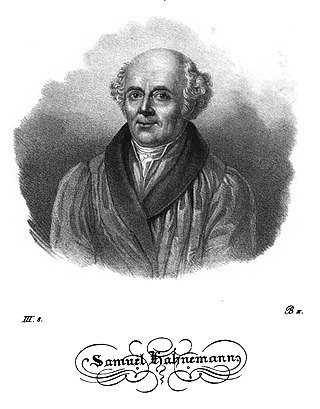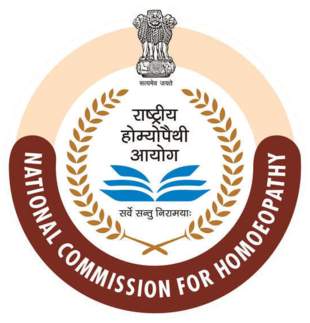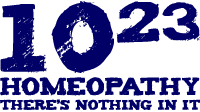Related Research Articles

Homeopathy or homoeopathy is a pseudoscientific system of alternative medicine. It was conceived in 1796 by the German physician Samuel Hahnemann. Its practitioners, called homeopaths or homeopathic physicians, believe that a substance that causes symptoms of a disease in healthy people can cure similar symptoms in sick people; this doctrine is called similia similibus curentur, or "like cures like". Homeopathic preparations are termed remedies and are made using homeopathic dilution. In this process, the selected substance is repeatedly diluted until the final product is chemically indistinguishable from the diluent. Often not even a single molecule of the original substance can be expected to remain in the product. Between each dilution homeopaths may hit and/or shake the product, claiming this makes the diluent "remember" the original substance after its removal. Practitioners claim that such preparations, upon oral intake, can treat or cure disease.

Naturopathy, or naturopathic medicine, is a form of alternative medicine. A wide array of practices branded as "natural", "non-invasive", or promoting "self-healing" are employed by its practitioners, who are known as naturopaths. Difficult to generalize, these treatments range from the pseudoscientific and thoroughly discredited, like homeopathy, to the widely accepted, like certain forms of psychotherapy. The ideology and methods of naturopathy are based on vitalism and folk medicine rather than evidence-based medicine, although practitioners may use techniques supported by evidence. The ethics of naturopathy have been called into question by medical professionals and its practice has been characterized as quackery.

James Tyler Kent (1849–1916) was an American physician best remembered as a forefather of modern homeopathy. In 1897 Kent published a massive guidebook on human physical and mental disease symptoms and their associated homeopathic preparations entitled Repertory of the Homeopathic Materia Medica, which has been translated into a number of languages. It has been the blueprint to many modern repertories used throughout the world and even remains in use by some homeopathic practitioners today.
Elizabeth Wright Hubbard was an American physician and homeopath best known for leadership and editorial work in the field of homeopathy.

The Faculty of Homeopathy was formed in 1944 from the British Homeopathic Society. It was incorporated by the Faculty of Homeopathy Act 1950, which confers an educational function on the Faculty. The Faculty promotes the development of homeopathy.
Sir John Weir was a Scottish physician and homeopath who served as Physician Royal to several twentieth century monarchs.
The British Association for Counselling and Psychotherapy (BACP) is a professional body for counsellors and psychotherapists practising in the United Kingdom.
George Vithoulkas is a Greek teacher and practitioner of homeopathy.
Homeoprophylaxis, or homeopathic prophylaxis, is the use of homeopathy, as a preventive medicine or immunisation against serious infectious diseases.

Homeopathy is fairly common in some countries while being uncommon in others. In some countries, there are no specific legal regulations concerning the use of homeopathy, while in others, licenses or degrees in conventional medicine from accredited universities are required.
The Ministry of Ayush, a ministry of the Government of India, is responsible for developing education, research and propagation of traditional medicine and alternative medicine systems in India. Ayush is a name devised from the names of the alternative healthcare systems covered by the ministry: ayurveda, yoga and naturopathy, Unani, Siddha, Sowa Rigpa, and homeopathy.
The Complementary and Natural Healthcare Council (CNHC) is a regulatory body in the United Kingdom which provides a voluntary register of complementary, rather than alternative medicine, therapists. The key purpose of CNHC is to act in the public interest and enable proper public accountability of the complementary therapists that it registers.

The National Commission for Homoeopathy is a statutory body under the Ministry of AYUSH, Government of India. Central Council of Homoeopathy was set up by the Government of India in 1973. The National Commission for Homoeopathy was constituted on 5 July 2021 and on the same date, the Homoeopathy Central Council Act, 1973 was repealed and the Central Council of Homoeopathy was superseded. It is one of the Professional Councils of University Grants Commission (UGC), formed to monitor higher education in India. Any institution desiring to grant a qualification in homeopathy is required to apply to the Council, which prescribes course curriculum and maintains central registers of homeopaths.

The 10:23 Campaign (stylized as 1023) is an awareness and protest campaign against homoeopathy organised by the Merseyside Skeptics Society, a non-profit organisation, to oppose the sale of homoeopathic products in the United Kingdom. The campaign has staged public "overdoses" of homoeopathic preparations.
Homeopathy practice is unregulated in New Zealand and homeopathic remedies are available at pharmacies, although there are calls to have them removed from sale.

The Professional Standards Authority for Health and Social Care (PSA), formerly the Council for Healthcare Regulatory Excellence (CHRE) and the Council for the Regulation of Health Care Professionals, oversees the ten statutory bodies that regulate health professionals in the United Kingdom and social care in England. Where occupations are not subject to statutory regulation, it sets standards for those organisations that hold voluntary registers and accredits those that meet them.

The Good Thinking Society is a nonprofit organisation promoting scientific scepticism established by Simon Singh in September 2012.

Natalie Grams is a German physician and author. Formerly a practicing homeopath, she became known throughout Germany as a whistleblower for her 2015 debut book Homeopathy Reconsidered – What Really Helps Patients in which she criticized homeopathy. From 2016 to 2023 she had been a member of the Science Council of the Society for the Scientific Investigation of Parasciences. From January 2017 to April 2020 she served as Communications Manager for the GWUP.
CEASE therapy is a pseudoscientific practice used by naturopaths who claim that it can treat or even cure people with autism, claims which have been adjudicated by the UK's Advertising Standards Authority as "bogus". It involves a mixture of supplements, high-dose vitamin C, 'orthomolecular support', dietary restrictions, and homeopathy. The therapy was developed by Dutch doctor Tinus Smits, who claimed to have used it to treat over 300 children with autism. It became more notable in 2017/2018 because of regulatory action taken by professional bodies in The Netherlands, UK, and Canada following a series of complaints about unfounded claims.
The infinitesimally low concentration of homeopathic preparations, which often lack even a single molecule of the diluted substance, has been the basis of questions about the effects of the preparations since the 19th century. Modern advocates of homeopathy have proposed a concept of "water memory", according to which water "remembers" the substances mixed in it, and transmits the effect of those substances when consumed. This concept is inconsistent with the current understanding of matter, and water memory has never been demonstrated to exist, in terms of any detectable effect, biological or otherwise.
References
- ↑ "The Society of Homeopaths Ltd". Companies House. Retrieved 14 July 2019.
- 1 2 "About the Society". Society of Homeopaths. Retrieved 14 July 2019.
- ↑ "Society of Homeopaths Annual Review 2018" (PDF). Professional Standards Authority. Retrieved 14 July 2019.
- ↑ "The Authority suspends accreditation of the Society of Homeopaths" (news). Professional Standards Authority. 11 January 2021.
- 1 2 Ernst, E. (2002), "A systematic review of systematic reviews of homeopathy", British Journal of Clinical Pharmacology, 54 (6): 577–82, doi:10.1046/j.1365-2125.2002.01699.x, PMC 1874503 , PMID 12492603
- 1 2 Science and Technology Committee, Evidence Check 2: Homeopathy, UK Parliamentary
- ↑ Homeopathy, National Health Service , retrieved 4 December 2014
- ↑ Altunc, U.; Pittler, M. H.; Ernst, E. (2007), "Homeopathy for Childhood and Adolescence Ailments: Systematic Review of Randomized Clinical Trials", Mayo Clinic Proceedings, 82 (1): 69–75, CiteSeerX 10.1.1.456.5352 , doi:10.4065/82.1.69, PMID 17285788,
However, homeopathy is not totally devoid of risks… it may delay effective treatment or diagnosis
- ↑ Shang, Aijing; Huwiler-Müntener, Karin; Nartey, Linda; Jüni, Peter; Dörig, Stephan; Sterne, Jonathan AC; Pewsner, Daniel; Egger, Matthias (2005), "Are the clinical effects of homoeopathy placebo effects? Comparative study of placebo-controlled trials of homoeopathy and allopathy", The Lancet, 366 (9487): 726–732, doi:10.1016/S0140-6736(05)67177-2, PMID 16125589, S2CID 17939264
- ↑ Musgrave, I (April 8, 2014). "No evidence homeopathy is effective: NHMRC review". The Conversation. Retrieved January 10, 2015.
- ↑ "Swiss make New Year's regulations". Swiss Info. Retrieved December 16, 2015.
- ↑ "ASA adjudication on Society of Homeopaths". ASA. 3 July 2013. Archived from the original on 6 July 2013. Retrieved 4 July 2013.
- ↑ "Advertising Standards for Homeopathy". Advertising Standards Authority. Retrieved 14 July 2019.
- ↑ "Society responds to the ASA". Society of Homeopaths. 29 September 2016. Retrieved 14 July 2019.
- ↑ "Society takes legal advice on the legitimacy of the ASA". Society of Homeopaths. 15 November 2016. Retrieved 14 July 2019.
- ↑ "Minutes of the 308th Meeting of the Board of Directors" (PDF). Society of Homeopaths. February 2017. Retrieved 14 July 2019.[ dead link ] Alt URL
- ↑ "Accredited Registers Programme - Accreditation Panel's Decision: Society of Homeopaths" (PDF). Professional Standards Authority. Archived from the original (PDF) on 28 February 2018. Retrieved 14 July 2019.
- ↑ "Society publishes position statement on CEASE". Society of Homeopaths. 1 June 2018. Retrieved 13 July 2018.
- ↑ "More than 120 homeopaths trying to 'cure' autism in UK". The Guardian. 27 April 2018. Retrieved 13 July 2018.
- ↑ "How homeopaths push useless alternatives to crucial vaccines". The Times. 4 May 2019. Retrieved 15 July 2019.(subscription required)
- ↑ "Society to protest to Press body after member is 'misled' by reporter". Society of Homeopaths. 7 May 2019. Retrieved 15 July 2019.
- ↑ "Society of Homeopaths Annual Review 2018" (PDF). Professional Standards Authority. Retrieved 14 July 2019.
- ↑ "Good Thinking files Judicial Review over PSA reaccreditation of Society of Homeopaths". Good Thinking Society. Retrieved 14 July 2019.
- ↑ "Homeopaths put children at risk with autism 'cure'". The Times. Retrieved 5 October 2019.
- ↑ "Homeopaths Reaccredited by Standards Body but With Conditions". February 14, 2020.
- ↑ "Professional Standards Authority suspends accreditation of Society of Homeopaths" . Retrieved January 11, 2021.